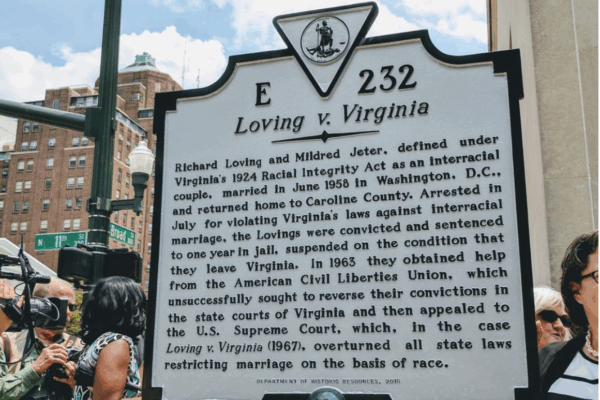Standing at the soon-to-be taken down Robert E. Lee statue in Richmond, I saw a sea of protesters of all races, colors, genders and faiths. They were chanting “Black Lives Matter” and “No Justice No Peace,” as General Lee sat lifelessly on his high horse, fading into the background. This image stood in stark contrast with an old photo from when the statue was unveiled in 1890 to a crowd of white Virginians celebrating the man who fought to keep Black people enslaved.
America in 2020 looks very different than it did in 1890. Today, everyone enjoys the constitutional right to marry the person they love, regardless of race, sex or gender — but this was not always the case. On June 12, 1967, the U.S. Supreme Court issued a historic ruling declaring Virginia’s ban on interracial marriages unconstitutional. That landmark case, Loving v. Virginia, paved the way for the legalization of same-sex marriage in 2015 and led to the multicultural, diverse country that we see today.
Every June 12, we join millions around the country in celebrating Loving Day. It’s a day to honor Richard and Mildred Loving, who refused to be silenced and persevered for nine years for their right to be together and live free from the government’s interference. It’s a day to take pride in our ACLU predecessors, Bernard Cohen and Philip Hirschkop, who took the case all the way to the Supreme Court and emerged victorious. Lastly, it’s a day to reflect on all the efforts of the Civil Rights Movement that created a political atmosphere more favorable for the Lovings to win their case in court.
The Lovings were not the only interracial couple back then. They were not unique in being persecuted for loving a person of another race while living in a state with racist, discriminatory laws. However, they were special because of a simple fact: They stood up. They brought the case and sued for the right to live together in their community in Central Point. As their case made its way through the court system, the Civil Rights Movement gained momentum all across America. Black people and allies participated in sit-in protests, boycotted segregated businesses, marched for voting rights and made major strides in changing the laws and policies, such as The Civil Rights Act of 1964.
Whether it is 1967 or 2020, the march toward justice is long and winding, but we must be resilient and push forward for justice.
These struggles for civil rights led by Black people happened in the streets, in the courts and at the statehouses. They gradually changed the racial attitude among white Americans. In 1958, when the Lovings were arrested, 24 states had laws banning interracial marriages. By 1967, that number had dwindled to 17. Then, on June 12, 1967, Loving v. Virginia was decided, striking down what the Lovings’ ACLU attorney described to the Justices as “the most odious of the segregation laws and the slavery laws.” This victory represents a triumph of love over hate. It is a win not only for the Lovings, but also for the hundreds of thousands of Black people who marched, bled and died for their humanity to be seen and recognized.
Loving Day arrives this year amid a global pandemic, as the nation is still reeling from the tragic deaths of George Floyd, Breonna Taylor, Aumaud Arbery, Tony McDade, Iyanna Dior and so many Black people who came before them. They should still be alive today, but they are not because of police violence and systemic racism.
This year, Loving Day arrives at a somber moment in America’s history, a moment that has opened many eyes to the reality of institutionalized racism. The painful images of Black lives senselessly lost to racism force each of us who are not Black to step back, reflect on our privileges, show up to protest and break the silence that has allowed racism and white supremacy to kill and dehumanize Black people for centuries.
Loving Day also arrives at a powerful moment when people, regardless of who we are or who we love, come together to fight for Black lives, lift up Black voices and demand justice for Black people. Protests have erupted all over the Commonwealth. People have risked arrests, braved tear gas and pepper spray, and stood fearlessly against a heavily armed, militarized police force to show solidarity with our fellow Black Americans.
Meanwhile, the ACLU of Virginia and ACLU affiliates all across the nation are filing lawsuits for voting rights, abortion rights, trans rights and immigrants’ rights. We are working hard to get people out of prisons and jails during the COVID-19 pandemic. We are listening and learning from Black-led organizations in our communities on how to divest from policing and invest in community-based public safety. The ACLU National and the ACLU of Michigan recently argued the first transgender rights case in the U.S. Supreme Court, while we’re still fighting to demand justice for Gavin Grimm in Virginia.
Whether it is 1967 or 2020, the march toward justice is long and winding, but we must be resilient and push forward for justice. Sometimes civil rights are won by a group of people coming together to demand justice. Sometimes they are won by individuals like Richard and Mildred Loving who stood up against unfair, unjust laws. There’s power in numbers. There’s beauty in unity. And there are glimpses of hope during these trying times.
James Baldwin once said: “History is not the past. It is the present. We carry our history with us. We are our history.” Our history was one of love, courage and resilience. That’s how we will march on.


